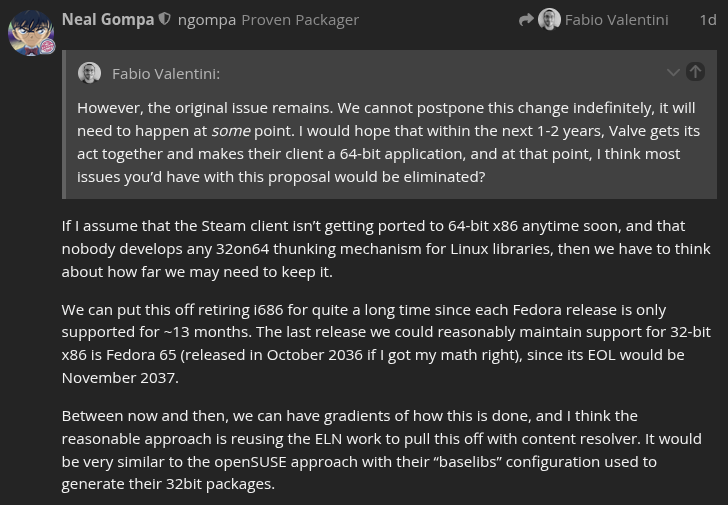
Fedora is known for adopting new technologies and making bold decisions well before other major Linux distributions. This approach has made it a top choice among developers and power users. Heck, even Linus Torvalds uses it.
But that forward thinking sometimes comes with controversy, and the latest example is its plan to completely ditch 32-bit support. The proposal outlines a two-step phase-out: first, removing all 32‑bit libraries from the 64‑bit (x86_64) repositories, and later, stopping i686 builds entirely.
Fedora argues this will eliminate a growing maintenance burden, pointing out that other distros have already dropped 32-bit support. They are right in that regard, but many others, especially in the Linux gaming community, are pushing back.
Among the critics is the founder of Bazzite, Kyle Gospodnetich, who has voiced serious concerns about what this change means for his project’s future.
Bazzite's Founder Isn't Happy
 Kyle communicated his point of view clearly.
Kyle communicated his point of view clearly.
Kyle argues that, while he understands the intention behind the change, it is simply too soon to drop 32-bit support. He warns this move would kill off projects like Bazzite entirely.
He points out that essential Steam use cases would break even if the required packages were rebuilt. Beyond the technical issues, Kyle warns of significant reputational damage to Fedora.
After he said all that, there has been a lot of back and forth between Fedora developers and community members. Some defend the move as necessary progress, while others continue to push to preserve key 32-bit components vital to gaming.
Kyle, at one point, even said that if the change were to go forward as it is written, then the best option would be to disband the Bazzite project.


Luckily, the situation is not a stalemate. The proposal to drop i686 support is still under discussion and has not yet been approved by the Fedora Engineering Steering Committee (FESCo).
Plus, Kyle agrees with what Fedora maintainer and FESCo member, Neal Gompa, has said:
If I assume that the Steam client isn’t getting ported to 64-bit x86 anytime soon, and that nobody develops any 32on64 thunking mechanism for Linux libraries, then we have to think about how far we may need to keep it.
We can put this off retiring i686 for quite a long time since each Fedora release is only supported for ~13 months. The last release we could reasonably maintain support for 32-bit x86 is Fedora 65 (released in October 2036 if I got my math right), since its EOL would be November 2037.
All in all, most people involved have handled the situation well. While there were a few offhand replies, the key parties seem to have reached a mutual understanding.
Suggested Read 📖
From It's FOSS News via this RSS feed
